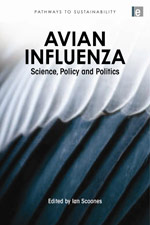Project dates: 2006-2011
The spread of avian flu (Highly Pathogenic Avian Influenza) in humans has raised alarm bells around the world. In recent years, the prospect of a catastrophe on the scale of the 1918 epidemic – or worse – has led to heavy investment in surveillance and response systems.
This project, which ran from 2006-2011, looked at global agencies responding to avian flu, and examined responses in four countries in SE Asia: Cambodia, Indonesia, Thailand and Vietnam. It explored:
- the processes and politics behind avian flu policy, what are assumptions made and how debates are framed by different people, including those not usually heard in policy circles;
- the impacts of the global and national responses to avian flu: how effective are they, and who are the likely winners and losers? Can these responses cope with uncertainty and surprise? Are they robust, durable and resilient?
Through these questions, this project has revealed key challenges, opportunities and obstacles for responding to avian flu – and potentially other epidemics. As such, the project is linked to our ongoing research on epidemics.
This research was supported by the FAO (UN Food and Agriculture Organisation) Pro-Poor Livestock Policy Initiative as part of a wider set of activities under the DFID funded Pro-Poor HPAI Risk Reduction Project.
 Avian Influenza: Science, Policy and Politics. Edited by Ian Scoones
Avian Influenza: Science, Policy and Politics. Edited by Ian Scoones
Over the past decade, substantial resources have been spent on tackling avian influenza and building a global capacity for a pandemic response. The catastrophic costs of the 1918 influenza pandemic are well documented, and the swine flu pandemic of 2009-10 has raised the alarm yet again. This book explores how virus genetics, ecology and epidemiology intersect with sconomic, political and policy processes in a variety of places. From the STEPS Centre’s Pathways to Sustainability series.
Available to buy from Earthscan-Routledge
STEPS members working on this project:
- Ian Scoones – Convenor
- Paul Forster, DPhil student – Indonesia case study
Project partners:
- Rachel Safman, National University of Singapore – Thailand case study
- Tuong Vu, Center for Contemporary Conflict, Naval Postgraduate School/National University of Singapore- Vietnam case study
- Sophal Ear, Dept of Public Administration, Maxwell School Syracuse/Naval Postrgraduate School, Monterey, California – Cambodia case study
